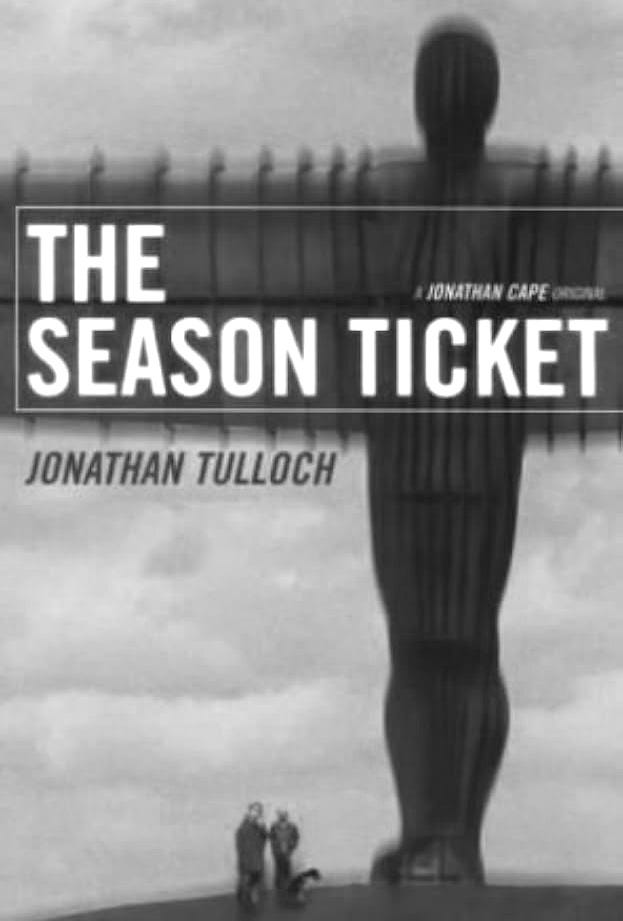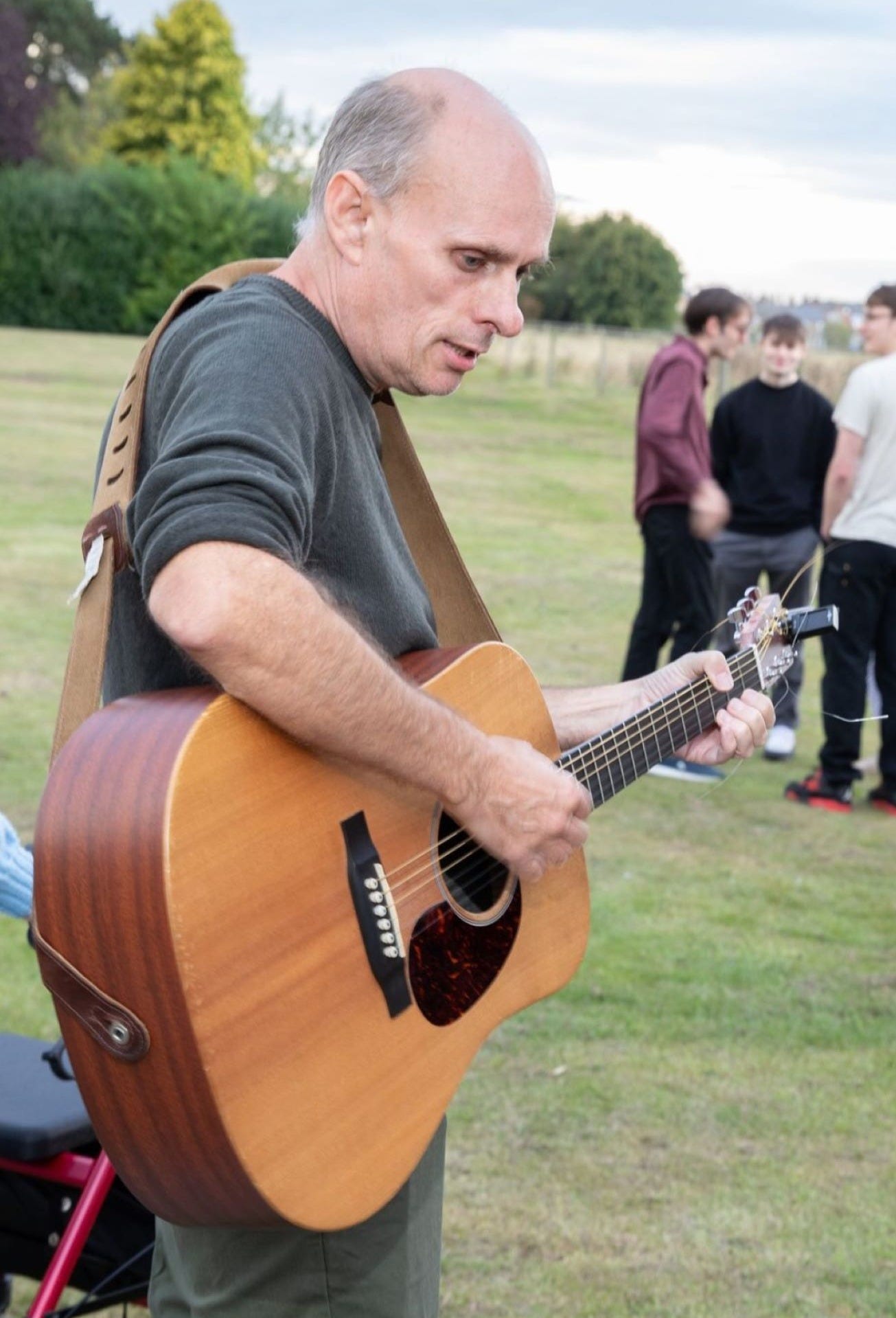“I’m really so pleased that it struck a chord with people"
The play Gerry & Sewell has been a hit for theatre maker Jamie Eastlake, but what of the man who wrote the novel which inspired it? David Whetstone catches up with Jonathan Tulloch ahead of kick off

Joining the audience for the first night of Gerry & Sewell at the Theatre Royal will be the man who wrote the novel it’s based on.
Jonathan Tulloch’s The Season Ticket introduced us to the two Gateshead teenagers whose dream of seats at St James’ Park, home of Newcastle United, repeatedly lands them in hot water.
The novel, published in 2000, describes a somewhat battered Tyneside before quayside regeneration, so no Gateshead Millennium Bridge or Baltic art galleries.
With the passage of time, fewer people remember those days. First novels, too, often vanish from sight.
But the story told in The Season Ticket burns as brightly as ever. Hot on the heels of the novel came the film, Purely Belter, and some years later adaptations for the stage.
“I’m really so pleased that it struck a chord with people,” says Jonathan on the phone from North Yorkshire where he now lives.
“It’s great…. and now to see this going on.”
Read more: Reggae legends’ double date with Tyneside
‘This’ is Jamie Eastlake’s stage adaptation, pulling Jonathan’s two main characters, the intense, fox-like Gerry and his strong but lumbering sidekick, into even sharper focus.
The Theatre Royal is the third theatre, after Laurels and Live, to stage Gerry & Sewell and the play script can also now be found in bookshops subtitled A Purely Belter Adventure.
Jonathan says he’s got to know Jamie and enjoyed his play in both places. It can be hard to see your work in others’ hands but theirs seems to have been a fruitful relationship.
“In the early days we were in a lot of discussions about stuff but then you just trust somebody.
“He’s bringing the whole of the Macarten family in now so it’s going to be very interesting to see.”
A bigger cast at the Theatre Royal means Gerry’s malfunctioning family (they’ve become McCarten in the play) can be a physical presence rather than just alluded to.
Jonathan grew up in Carlisle where, he says, everyone looked to Newcastle as “the big town”.
He confesses to being a cricket fan, a supporter of Durham, and to being the son of a Mackem.
“I do like football and I’d go with my dad to watch Sunderland when he was around. But I remember going to watch Newcastle too.

“The guy used to let us in at half time, jumping over the turnstile. This was the ’80s. But I think it’s the way St James’ Park is, this summit above everything.
“It’s so imposing and dramatic when the fans get together. You get pulled into it.
“But actually I always want all the region’s teams to do well.”
Jonathan moved to Gateshead in 1990, revelling in the sights and sounds of the place.
“I just loved the Geordie culture. Brilliant. The music, the way people speak. I really liked all that. And I’d been away with my wife-to-be doing voluntary work in Africa and when I came back it was as if I saw everything with new eyes.
“It was the people. I loved the places, the history. Everywhere you walked there was something and everything felt so grand to me.”
All this spills onto the pages of The Season Ticket, making it much more than just a funny story about two skint lads. Working as a teacher at St Thomas More Catholic School in Blaydon clearly helped Jonathan tap so convincingly into the teenage mindset.
And if you go back to the book you’ll see it makes perfect sense that Jonathan now contributes the bite-sized Nature Notes column in The Times three days a week (Wednesday to Friday). He does a longer column for venerable Yorkshire publication The Dalesman.
You don’t have to read between the lines to see The Season Ticket as a nature book, a celebration of Gateshead’s wilder places.
“It’s like a forest if ye close your eyes,” says Gerry on page 32, listening to the “high hum” of the bees as he and Sewell negotiate the path behind the Spartan Redheugh factory.
And where the River Team bubbles through waste ground on its way to the Tyne, “there are trees, willows, alders and sycamore, and small inlets for mallard ducks to breed. Grey wagtails land on stones. Kingfishers whirr their kaleidoscope through the monotonous Gateshead grey.”
“Where we lived was very near to the old Watergate Colliery, Lobley Hill,” remembers Jonathan.
Read more: Review - Wicked at Sunderland Empire
“When I was there it was just this beautiful wilderness really. I was obsessed with places like Washingwell Woods.
“As industry shrunk away it left these lovely areas where you weren’t supposed to go but everyone did. There were improvised paths across everything. It was real Gerry and Sewell-friendly terrain.”
Things might have been tidied up to a degree but Jonathan says: “Everything changes but everything also stays the same. You can still see a real keel boat in the mud, lying there like a dinosaur.”
Jonathan dedicated The Season Ticket to his wife, Shirley, who was once his means to an encounter with Kevin Keegan, Newcastle United’s impassioned manager.
“She was also a teacher and did a charity record with Kevin and Tony Blair and some sixth formers. We did it in Windows (the Newcastle music shop) and Peter Beardsley and Les Ferdinand and a lot of the players sang on it.
“I remember going along and talking to Kevin about charity work.”
Although they moved from the area in 2000, Jonathan says he gets back to Tyneside regularly, leading expressive writing courses for people fighting mental illness or addiction.
“Doing these classes I understand how lucky I’ve been because I’m coming up against unpublished writers who are massively talented all the time,” he says.
“And you do think a lot of it’s down to luck really. Just being in the right place at the right time. There’s a hell of a lot of talented people who never get a chance.”
Along with his journalism and his teaching, Jonathan is still writing fiction.
His most recent book, Cuckoo Summer, published in 2022, is an adventure for children inspired by his mother’s experiences as a girl in Cumbria during the war.
“It’s about a Geordie girl called Sally who’s an orphan and comes to the Lake District as an evacuee. She and a local boy, Tommy, find a German airman hiding in the woods.”

Its main character, he reckons, is a bit like a female Gerry. The accent and the dialect firmly root the narrative. “I’ve been told not to use dialect over the years but I just can’t help it,” says Jonathan.
Next up, he thinks, will be a nature book but there’s another novel simmering too.
This week, though, he’ll be at Newcastle Theatre Royal where Gerry & Sewell begins its four-day run.
“As industry shrunk away it left these lovely areas where you weren’t supposed to go but everyone did. There were improvised paths across everything. It was real Gerry and Sewell-friendly terrain.”
Jonathan Tulloch
A particular point of interest for Jonathan is that son Aidan has contributed some of the music for the show.
Aidan, says Jonathan, and I reckon he’s only pretending to sound rueful, seems to be following him along the creative path, undeterred by all the uncertainties which have been explained to him.
And he adds that Aidan is a Gateshead Millennium Baby, which is to say one of the 1,000-plus babies who in 1999 joined a Newcastle University scheme which is monitoring child health in the North East over the long term.
Along with The Season Ticket, you might therefore say Jonathan Tulloch is the father of two millennium babies minted in the North East – one literary and one a chip off the old block.
He should be a very proud man indeed.
Gerry and Sewell is at Newcastle Theatre Royal from October 2-5. Visit the website for tickets.
Jonathan has a podcast, Birth of a Naturalist, which you can find here






